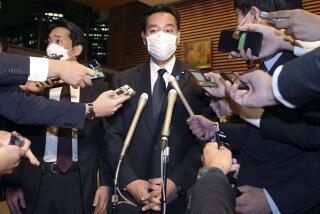NEWS ANALYSIS : Clinton Rookies to Face Japanâs Stars
TOKYO â When President Clinton and his crew meet with Japanese Prime Minister Kiichi Miyazawa and his entourage Friday to talk tough on trade, they could find themselves outgunned by better-equipped Japanese negotiators.
Start at the top. Clintonâs experience with Japan is limited to three short trips he made as governor of Arkansas to attract Japanese investment. Heâs a fast learner, but his recent comments on Japan--that Japanâs trade surplus shows its market is closed, plus his tip to Russian President Boris N. Yeltsin in private dinner conversation at the Vancouver summit that Japanese tend to say âyesâ when they mean ânoâ--show he has a crude, if not inaccurate, understanding of Japan.
In contrast, Miyazawa has spent virtually his whole career dealing with trade issues. He has been Japanâs chief delegate to past General Agreement on Tariffs and Trade talks, and as a former minister of international trade and industry he has an intimate knowledge of the strengths and weaknesses of Japanese and American industry. As a former bureaucrat in the elite Finance Ministry, he has a quick grasp of numbers.
And Miyazawa speaks good English, so the two leaders can converse without the awkwardness of an interpreter.
Miyazawa also knows when to hold and when to fold. Although Japan has been accused of blocking GATT progress by refusing to liberalize its rice market, Miyazawa wonât give in on the politically sensitive rice question until the last minute.
Now look at Clintonâs key appointees. Winston Lord, who is in charge of East Asian affairs at the State Department, is a China expert with little knowledge of Japan or the regionâs economic forces.
U.S. Trade Representative Mickey Kantor and Commerce Secretary Ronald H. Brown, both lawyers, have worked for Japanese clients and know the Japanese position on many trade issues. But neither they nor any of the senior members of their respective organizations speak Japanese or have in-depth knowledge of Japan.
âIf you know the real concerns of Japan, you can craft efforts to further American interests without unnecessarily angering Japan,â says one American executive who declined to be named. âYou can take advantage of the factionalism among the government ministries.â
When Secretary Brown recently sent Japan a note demanding that Japanese auto companies fulfill a voluntary pledge to buy more auto parts, he only increased Japanâs resolve not to make similar offers in the future. âYou (Americans) pushed us into a corner and made it difficult for us to back down,â says an official of the Ministry of International Trade and Industry (MITI).
While the contacts of American officials are limited to the small number of Japanese officials assigned to deal with foreigners, Miyazawaâs entourage is filled with bureaucrats educated abroad who speak almost flawless English and hobnob with a broad range of influential people in government, academia and the media.
The American tendency to appoint thousands of new officials with each new Administration means Clintonâs officials must virtually start from scratch when it comes to learning about the negotiating styles and practices of their foreign counterparts.
On the Japanese side, virtually every key official has been steeped in trade issues for decades.
More to Read
Sign up for Essential California
The most important California stories and recommendations in your inbox every morning.
You may occasionally receive promotional content from the Los Angeles Times.










